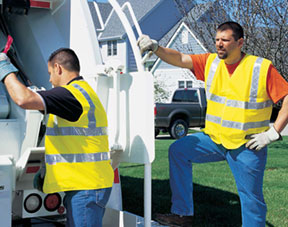 (NewsUSA) – Trade and technical positions are the bright, shining stars of the economy these days. They don’t require a college degree, do provide the opportunity for a meaningful career, and they often pay very well.
(NewsUSA) – Trade and technical positions are the bright, shining stars of the economy these days. They don’t require a college degree, do provide the opportunity for a meaningful career, and they often pay very well.
One industry, in particular, shines brightest among those hiring these positions: America’s waste and recycling business.
“These are great careers,” says Sharon H. Kneiss, president and CEO of the National Waste & Recycling Association. “We do a real service for residents and business owners alike. And business is growing!”
According to the Bureau of Labor Statistics, the number of waste and recycling collectors is expected to grow significantly over the next seven years. Between 2012 and 2022, more than 21,000 jobs are expected to be created — a 16-percent growth rate.
In 2012, the median annual pay for truck drivers was about $38,000. With overtime, experienced waste and recycling drivers can earn much, much more. Some workers in various cities make upwards of $100,000 when you factor in overtime. And, most jobs in the field offer generous benefits and possibilities for upwards mobility.
Driving a refuse truck generally requires a commercial driver’s license; however, companies are happy to train new recruits.
“The advantages of driving a waste or recycling vehicle are significant: the hours are regular and predictable, the job is local, and it pays well,” Kneiss said. “Plus there’s job security: We’re always going to need good drivers.”
But the opportunities in the waste and recycling industry don’t end there. Mechanics and welders who work on the industry’s fleet are also in significant demand.
For example, the BLS reports that the 2012 median pay for a diesel mechanic was more than $42,000 per year and that the total number of jobs across all industries was expected to grow by 9 percent from 2012 to 2022 — more than 21,000 additional positions.
There are both formal and informal diesel mechanic training programs. In some cases, the company will train you. But there are also a number of programs offered by vocational schools, community colleges and adult education programs.
In addition, mechanics qualified to work on compressed natural gas engines would do well to investigate the waste and recycling industry: It has one of the largest CNG truck fleets in the U.S.
To learn more about opportunities in the waste and recycling industry, go to http://beginwiththebin.org/jobs.
Waste and Recycling Jobs: Opportunities Are Plentiful

Featured Partner
Contributor
Font Size:

